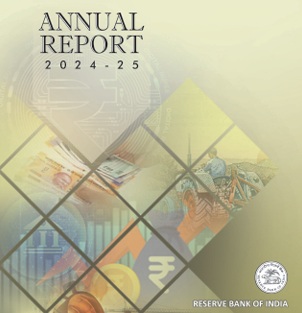Climate change, cybersecurity, crypto currency, FinTech, CBDC and tech disruptions through AI/ ML also require coordinated policy response at the global level.

FinTech BizNews Service
Mumbai, May 29, 2025: According to the Reserve Bank of India's Annual Report for 2024-25 released today, the global economic outlook for 2025 and 2026 remains clouded by multiple challenges: the pace of disinflation losing momentum; elevated public debt across several economies; protracted geopolitical tensions; heightened trade tensions; financial market volatility; and climate shocks.
The global economy is projected to grow by 2.8 per cent in 2025 and 3.0 per cent in 2026 (3.3 per cent in 2024). The growth in EMDEs is projected at 3.7 per cent in 2025 and is expected to improve marginally to 3.9 per cent in 2026.
The growth rate in AEs is projected to decelerate to 1.4 per cent in 2025 from 1.8 per cent in 2024, before marginally improving to 1.5 per cent in 2026. I.40 Global inflation is expected to moderate from 5.7 per cent in 2024 to 4.3 per cent in 2025 and further to 3.6 per cent in 2026. However, the near-term trajectory of price stability may still face challenges with services inflation remaining stubborn in several parts of the world, enhanced tariffs increasing inflation in the US and possible risks of desynchronization of monetary policy responses.
Global merchandise trade volume is projected to contract by 0.2 per cent in 20259 under the adjusted scenario based on the tariff situation as of April 14, 2025. However, the signing of a trade deal between the US and the UK on May 8, 2025 and the agreement made by the US and China on May 12, 2025 to avoid retaliation and to engage in future discussions augur well for global trade, going ahead. I.42 High levels of public debt in major AEs and EMEs are raising concerns around the sustainability of public finances in these economies and run the risk of adding to already heightened financial market volatility. Elevated sovereign debt levels in systemic economies are already leading to spikes in risk premia and yields. Stretched asset valuations, with capital f lows chasing yields, could lead to tightening f inancial conditions, thereby raising financial stability concerns as evidenced by episodic sell off pressures in global equity markets during 2024. Disorderly adjustments in financial markets of systemic AEs have the potential to spillover to EMDEs amidst persistent geopolitical tensions, geoeconomic fragmentation, emergence of trade tensions and disruptive technological shocks. Climate change, cybersecurity, crypto currency, FinTech, CBDC and tech disruptions through AI/ ML also require coordinated policy response at the global level.